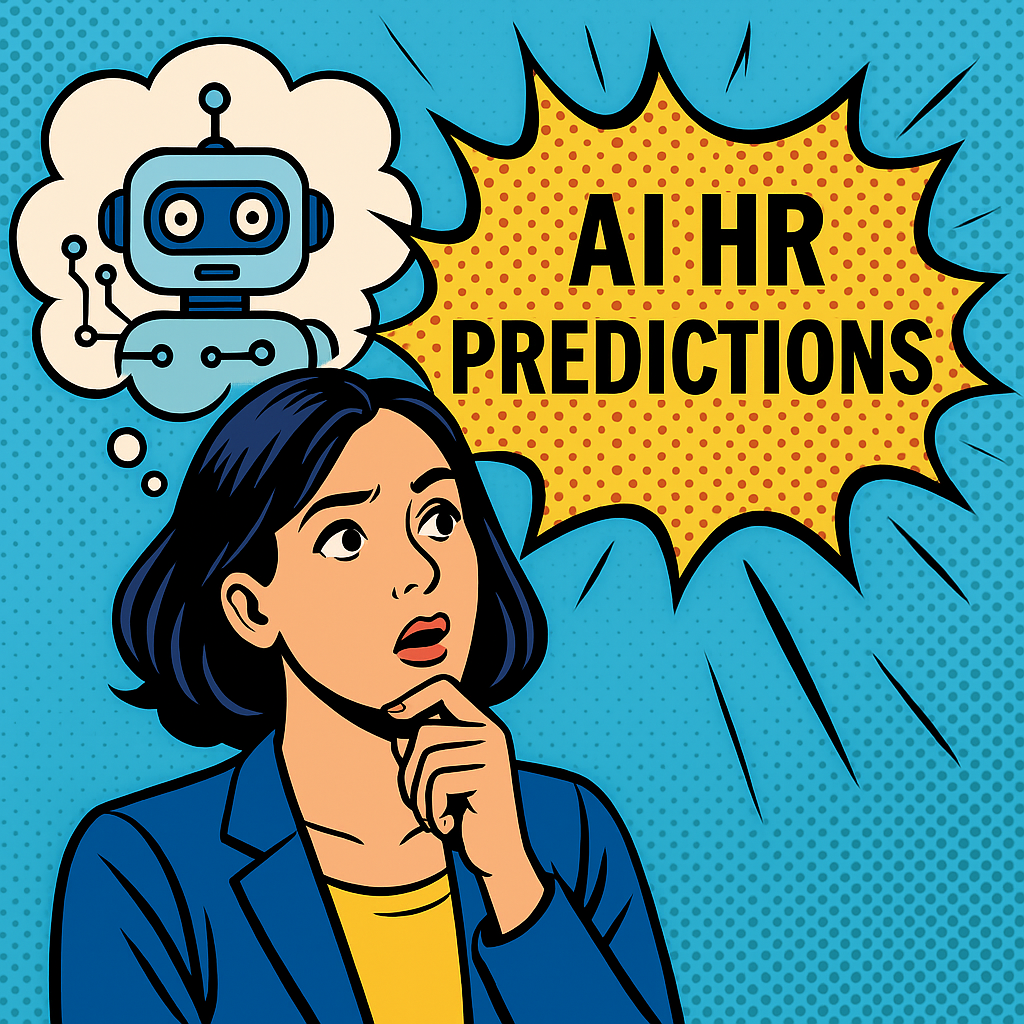- Why I Used Grok + Gemini and ChatGPT to Build My Outreach List (And How Recruiters Can Too) - January 22, 2026
- The Diversity & Inclusion Glossary — A List of 300+ Helpful Diversity Terms (2026 Update) - January 19, 2026
- Why You Need a Job Description Revision Tracker (Before Your Next Audit) - January 9, 2026
Every HR pro wants to know what AI will do to their job. The truth? No one really knows. I was just at dinner last night with a partner, and we both admitted we’re all making this up as we go.
But here’s what I do know: AI in HR isn’t some far-off thing anymore. It’s not a buzzword. It’s in the tools you’re already using (even if you haven’t noticed yet), and it’s creeping into every HR corner—from how we write job descriptions to how we manage performance reviews.

So, what are the real AI HR predictions for 2025 and beyond?
Not the sci-fi kind. Not the “AI will take all your jobs” headlines. I’m talking about the kind of predictions that came up over that dinner conversation. The kind that make you wonder: will we all have AI robots like the Jetsons?
It’s not just me thinking this way. I saw this LinkedIn post from The Modern People Leader floating around, and it nailed it: Execs say “let’s roll out AI,” and HR folks are left wondering what that actually means. That’s the tension. That’s where we all are right now.
1. Most HR teams still don’t have a real AI strategy
We all know AI is coming into our work. But most teams haven’t moved beyond experimenting with ChatGPT or buying one tool with “AI” slapped in the sales deck. There’s no roadmap. No plan for how AI integrates with hiring, retention, comp, or even compliance.
If you’re nodding, you’re not alone. That’s what the AI in HR Podcast is all about—real HR leaders trying to figure out what AI should do (and what it shouldn’t).
2. HR tech vendors will overpromise (again)
2026’s going to be the year of overhype. We’re already seeing it—vendors throwing “AI” into every feature name. One HR tech vendor I read about last month pitched their tool as “an AI talent partner.” What they really meant was: “We made our chatbot a little smarter.” That’s not AI. That’s marketing.
Evolving HR in 2025 breaks down some AI trends in a no-nonsense way.
3. Recruiters will become prompt engineers
No, I’m not saying you’ll need to code. But knowing how to write killer prompts? That’s a new skill. The people who can talk to AI in a way that gets real results—from generating compliant job descriptions to customizing outreach—will become superpowered recruiters.
This is a trend I heard loud and clear in the HR Leaders Podcast on how AI is changing hiring. Prompting is the new sourcing.
4. The biggest risk isn’t bad AI, it’s HR inaction
Let me say this clearly: Doing nothing is the risky move. Sitting back while others experiment means you’ll be catching up later, and the talent market’s not slowing down for anyone. Even if your AI game plan is just “try one tool this quarter and talk about it”—that’s movement. That’s momentum.
Even Nine to Thrive HR is seeing this with talent strategy leaders—those who move fast, test early, and share wins (and failures) are the ones building influence inside their orgs.
So what should you do now?
- Start a conversation. Grab lunch with your comp lead, your recruiter, your HRBP. Ask: “Where could AI actually help us?”
- Pick one thing. Choose one part of your workflow to automate or enhance with AI.
- Stay skeptical, but curious. Challenge vendors. Ask how their AI works. Don’t fall for the buzz. But don’t freeze, either.
- Listen to the right people. The podcasts I linked throughout this post? Start there.
Why I Wrote This
I wrote this because too many HR and TA leaders feel like they’re behind on AI. You’re not. The space is still unfolding, and the best move is a smart, intentional one. At Ongig, we help you take action on the stuff you can control—like making your job descriptions smarter and more inclusive. Want to see how AI can actually help your recruiting efforts today? Request a demo.
FAQs
What is AI in HR?
AI in HR refers to using artificial intelligence tools to automate, predict, or enhance HR processes like hiring, performance, learning, or employee engagement.
What are the benefits of AI in HR?
AI can save time, reduce bias, identify trends, and personalize experiences—when used right. But it’s not a silver bullet. You still need humans to guide the tech.
Which HR areas will AI impact the most?
Recruiting, talent analytics, learning & development, and workforce planning are top areas already being transformed.
Can AI replace HR jobs?
Not entirely. AI might replace tasks, not entire roles. The most valuable HR pros will be those who learn to partner with AI, not fear it.
Where can I learn more about AI in HR?
Check out the AI in HR Podcast, AI-volution, HR Leaders Podcast, Nine to Thrive HR, and Evolving HR in 2025.
